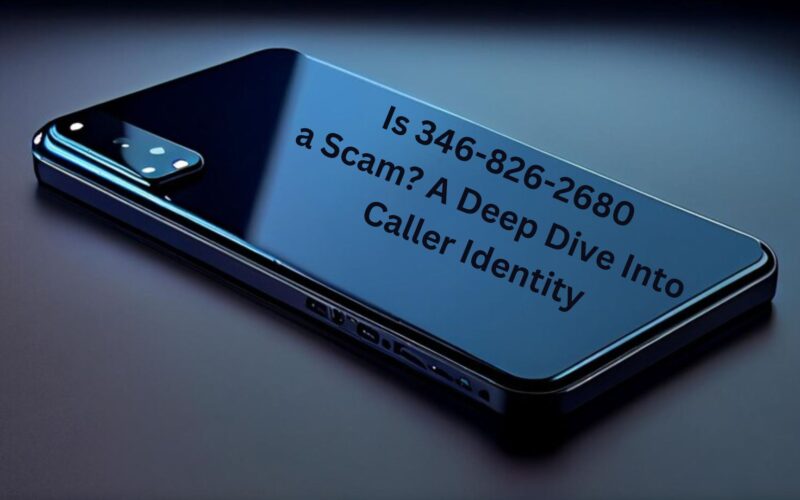Have you ever received a call from an unfamiliar number and felt that twinge of uncertainty? You’re not alone. In today’s world, phone scams are on the rise, leaving many of us wary about whom we pick up for. One such number that has been cropping up in conversations is 346-826-2680. Is it a legitimate caller or just another scam artist trying to reel in unsuspecting victims? Join us as we delve deeper into this mysterious number and uncover what lies beneath the surface of unsolicited calls. Your peace of mind might be just a few paragraphs away!
What is 346-826-2680?
The number 346-826-2680 has garnered attention in various online forums and social media platforms. Many users report receiving calls from this specific number, often leading to confusion and concern.
Most commonly associated with unsolicited outreach, it raises red flags for potential scams or telemarketing efforts. The area code 346 corresponds to Texas, further adding to the intrigue of who might be on the other end of the line.
Curiosity surrounds its true purpose. Is it a legitimate business attempting to make contact or a scammer trying to exploit unsuspecting individuals? As more people share their experiences, understanding this number becomes crucial for those wishing to avoid unwanted interactions.
Identifying whether 346-826-2680 is genuine or not can help protect consumers from possible fraud. Awareness is key when navigating unfamiliar phone numbers in today’s digital age.
Overview of the Number 346-826-2680
The phone number 346-826-2680 has raised eyebrows among many who have received calls from it. Often associated with unsolicited communications, this number appears frequently on various scam alert forums.
Reports indicate that callers may present themselves as representatives of legitimate businesses or service providers. However, the nature of these calls often feels intrusive and suspicious.
Additionally, individuals claim to have been pressured into sharing personal information during conversations with this number. Such tactics are common in scam operations aimed at exploiting unsuspecting victims.
A quick search reveals that 346-826-2680 is linked to numerous complaints about aggressive marketing practices and potential scams. The anonymity provided by caller ID spoofing adds another layer of complexity to identifying the true source behind the call.
Real Life Experiences with 346-826-2680
Numerous individuals have reported receiving calls from 346-826-2680, sparking curiosity and concern. Many describe the experience as unsettling.
Some recipients claim the caller quickly hung up after a brief silence. Others noted aggressive sales pitches that left them feeling pressured or confused.
A few users took to social media platforms, sharing their frustration over unsolicited calls during odd hours. These accounts often included questions about whether others had similar experiences with this number.
There are also reports of attempted scams involving promises of money in exchange for personal information. This has raised alarms among those who value their privacy and security.
The variety of responses emphasizes how one unknown call can evoke different emotions and reactions—from annoyance to anxiety—making it clear that 346-826-2680 is not just another random number; it’s part of a larger conversation about safety in communication.
Research and Investigation of the Caller’s Identity
When it comes to unknown phone numbers like 346-826-2680, digging deeper is essential. Scammers often hide behind fake identities, making it crucial to uncover the truth.
Investigating this number typically involves checking online databases and forums where users share their experiences. Many people have reported similar calls from suspicious numbers, leading to a pattern that can help identify potential scams.
Social media platforms also serve as valuable resources. Searching for the number can reveal whether others have flagged it as fraudulent. Websites dedicated to reporting scam callers provide real-time updates about ongoing schemes linked to specific numbers.
In some cases, contacting your service provider might yield helpful information. They may offer insights into whether they’ve received complaints regarding 346-826-2680 or any relevant warnings related to similar calls. Understanding who’s on the other end of the line is key in protecting yourself against deceitful tactics.
Tips for Dealing with Suspicious or Scam Calls
When you receive a call that feels off, trust your instincts. Don’t engage with the caller unless you’re confident about their identity.
Always verify the number. Search for it online and see if others have reported it as suspicious. Websites like WhoseNumber.com or spam alert forums can provide valuable insights.
If they claim to be from a company, hang up and contact that company directly using official channels. This ensures you’re speaking with legitimate representatives.
Don’t share personal information over the phone, especially financial details. Legitimate organizations rarely ask for sensitive data in unexpected calls.
Consider using call-blocking apps or features on your smartphone to reduce unwanted contacts significantly. Reporting scam numbers helps build awareness and protect others too.
Stay calm during these interactions; scammers often rely on panic to manipulate their targets.
Conclusion: How to Protect Yourself from Phone Scams
Protecting yourself from phone scams requires vigilance. Always be cautious when answering calls from unknown numbers like 346-826-2680. If you don’t recognize the number, let it go to voicemail.
Verify callers by asking for their name and purpose of the call. Legitimate businesses will not hesitate to provide this information.
Consider installing a call-blocking app or using built-in features on your smartphone to filter suspicious calls.
Never share personal information over the phone unless you are certain about who you’re speaking with. Scammers often prey on urgency or fear, so take your time before responding.
Educate yourself about common tactics used by fraudsters. Awareness is one of your best defenses against falling victim to these schemes. Stay informed and proactive in safeguarding your privacy and financial security at all times.
Caller Identity
Caller identity plays a crucial role in our daily communications. With the rise of smartphones, knowing who’s on the other end has never been more important. People often rely on caller ID to filter out unwanted calls.
However, not all caller IDs are trustworthy. Scammers have become increasingly sophisticated, using technology to mask their true identities. This makes it challenging for individuals to discern legitimate calls from fraudulent ones.
Understanding how caller ID works can empower consumers. Legitimate organizations typically display accurate information while scammers use tactics like spoofing to mislead you.
Staying vigilant is essential. Trust your instincts when a call feels off or if the number seems unfamiliar. It’s always better to err on the side of caution and verify before engaging further with unknown callers.
The Rise of Caller ID Spoofing and Scams
Caller ID spoofing has become a prevalent tactic among scammers in recent years. This deceptive practice allows fraudsters to disguise their true number, making it appear as though they’re calling from a legitimate source. The implications of this have been significant.
Many unsuspecting individuals answer calls thinking they’re speaking with trusted organizations—banks, government agencies, or even friends and family. Once engaged, the caller can manipulate the conversation to extract personal information or money.
The technology behind spoofing is readily available and often easy to use. Scammers exploit this accessibility to target vulnerable populations, leading to an alarming rise in reported scams.
As these tactics evolve, awareness becomes crucial for consumers. Knowing how scammers operate can empower people to question unexpected calls and protect themselves against potential threats. Staying informed is key in this ongoing battle against phone fraud.
How to Protect Yourself from Caller ID Spoofing
Caller ID spoofing can leave you feeling vulnerable. However, there are ways to shield yourself from these deceptive tactics.
First, always verify unfamiliar numbers. If a call seems suspicious, hang up and look up the number online. Often, others may have reported it as fraudulent.
Use call-blocking apps or features available on your smartphone. These tools can help filter out known spam calls before they reach you.
Consider registering your number with the National Do Not Call Registry. While this won’t eliminate all robocalls, it can reduce unwanted solicitations significantly.
Stay informed about common scams circulating in your area. Awareness is a powerful defense against fraudsters using social engineering techniques to manipulate victims.
Trust your instincts; if something feels off during a conversation, don’t hesitate to disconnect and report the number to authorities for further investigation.
What to Do If You Receive a Call from 346-826-2680
Receiving a call from 346-826-2680 can be unsettling. If you answer and the caller seems suspicious, stay calm. Don’t provide any personal information right away.
You might want to let it go to voicemail. Scammers often hang up or leave generic messages when they know they’re not getting through.
If you’re curious about who called, consider searching online for any reports related to this number. Many people share their experiences with unknown callers, which could offer insight into whether it’s a scam.
Blocking the number is also an option if you feel uncomfortable. Most smartphones have easy-to-use features that allow you to stop unwanted calls permanently.
Report the number to your local authorities or consumer protection agency if it feels like a scam attempt. This helps raise awareness and protect others from potential fraudsters targeting unsuspecting individuals.
Other Common Phone Scams and How to Avoid Them
Phone scams come in various forms, each designed to trick you into giving away personal information or money. One common scheme involves fake tech support calls. Scammers pose as representatives from well-known companies, claiming your device has a virus that needs urgent attention.
Another prevalent scam is the “IRS” call, where crooks impersonate tax officials threatening legal action if immediate payment isn’t made. This tactic creates panic and leads unsuspecting victims to comply quickly.
Romance scams are also on the rise. Fraudsters use online platforms to establish emotional connections and eventually ask for money under false pretenses.
To avoid falling victim, always verify the identity of callers before sharing any details. Hang up on suspicious calls and consult official sources for legitimacy when needed. Trust your instincts; if something feels off, it probably is.
Conclusion
Protecting yourself from phone scams requires vigilance. Being aware of suspicious numbers like 346-826-2680 is essential.
Educate yourself about common tactics scammers use. Knowledge empowers you to spot red flags before it’s too late.
Use call-blocking apps and features on your phone to manage unwanted calls effectively. These tools serve as a first line of defense against intrusive scam attempts.
Stay informed about the latest scams circulating in your area or online community. Awareness can keep you one step ahead.
Always trust your instincts when receiving unexpected calls. If something feels off, it’s best not to engage with the caller.
Taking proactive measures today can safeguard both your personal information and peace of mind tomorrow. Staying vigilant creates a strong barrier against potential threats that roam through our phones daily.
FAQs
Is 346-826-2680 a scam? Many users have reported suspicious activity linked to this number. It’s essential to stay vigilant and be aware of potential scams.
What should I do if I receive a call from 346-826-2680?
If you get a call from this number, it’s best not to engage with the caller. Let it go to voicemail and listen for any red flags in the message.
How can I identify whether a phone number is legitimate or not?
You can search online for user reviews or complaints related to that specific number. Websites like WhoCallsMe and Better Business Bureau provide valuable insights.
Are there other numbers similar to 346-826-2680 that are associated with scams?
Yes, many variations exist. Scammers often use different area codes or slight modifications of known scam numbers. Always proceed with caution when receiving calls from unknown numbers.
What steps can I take if I’ve been scammed via phone?
Report the incident immediately to your local authorities and consider contacting your bank if sensitive financial information was shared.
By staying informed about such numbers as 346-826-2680, you enhance your defenses against potential scams, ensuring safer communication experiences moving forward.




